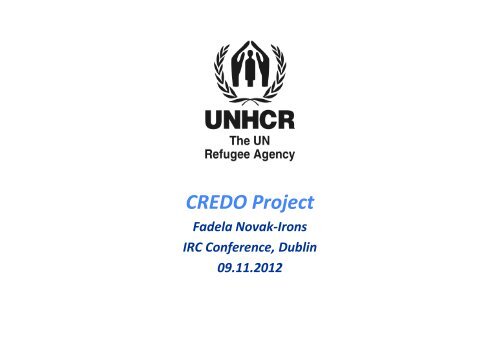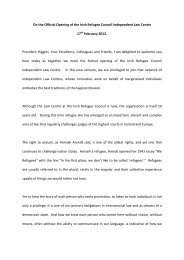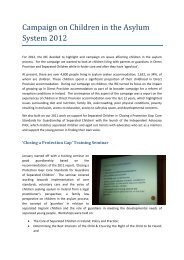CREDO Project IRC Dublin 09.11.2012 - Irish Refugee Council
CREDO Project IRC Dublin 09.11.2012 - Irish Refugee Council
CREDO Project IRC Dublin 09.11.2012 - Irish Refugee Council
Create successful ePaper yourself
Turn your PDF publications into a flip-book with our unique Google optimized e-Paper software.
<strong>CREDO</strong> <strong>Project</strong><br />
Fadela Novak-Irons<br />
<strong>IRC</strong> Conference, <strong>Dublin</strong><br />
<strong>09.11.2012</strong>
The Importance of Quality<br />
• Quality assurance: the way forward for EU<br />
implementing all aspects of CEAS<br />
• Not merely an important area of focus for states<br />
facing challenges BUT an ongoing area of work for<br />
all states<br />
• Focus on quality is needed to ensure states fulfil<br />
their obligation under the asylum acquis<br />
• UNHCR past quality projects: QI (UK, 2004-),<br />
ASQAEM (Central Eur., 2008-10), FDQ (12 MS,<br />
2010-11), other national level quality activities
The Importance of Credibility<br />
• At the core of asylum procedure<br />
– Credibility findings: identification of<br />
material facts<br />
• Estimates of credibility rejections<br />
– EU MS estimates: Between 25% and 60%<br />
– UNHCR APD Study estimates:<br />
• The majority of all rejected cases<br />
– Research estimates: between 48% and<br />
90%
Challenges<br />
• Decision under conditions of uncertainty<br />
• Absence of witnesses<br />
• Difficult to obtain documentary evidence<br />
• General nature of COI<br />
• Inter-cultural context<br />
• Human behaviour<br />
• Role of memory<br />
• Vulnerabilities and trauma
UNHCR’s Concerns<br />
• Divergences in standards of proof<br />
• Decisions not explicit re. evidence accepted or<br />
rejected, and standard applied<br />
• Deduced from the decision: high standard of<br />
proof applied<br />
• Assumptions and stereotypes<br />
• Use of applicant’s demeanour in credibility<br />
assessments<br />
• No opportunity to comment on adverse<br />
credibility findings<br />
• Not well-reasoned decisions
<strong>CREDO</strong> <strong>Project</strong><br />
-<br />
Improving credibility<br />
assessment in the asylum<br />
system
<strong>CREDO</strong> project<br />
• ERF funded<br />
• Sept. 2011 – April 2012<br />
• 3 project partners: HHC, UNHCR, IARLJ<br />
• 3 project outputs:<br />
– HHC: training manual for asylum practitioners – a multidisciplinary<br />
approach<br />
– UNHCR: report on state practices<br />
– IARLJ: Judicial guidance<br />
• Brussels Seminar – launch 3 products, share<br />
experiences, engage discussion on key issues<br />
• N.B. Child credibility assessment – out of scope
<strong>CREDO</strong> project – UNHCR Component<br />
• Methodology:<br />
– National research: BE, NL, UK<br />
• desk-based research (legal and policy framework,<br />
jurisprudence, training tools)<br />
• 10 interview observations<br />
• 40 file reviews (top 3 nationalities – representative<br />
proportion of grants and declines )<br />
• 10 interviews with decision-makers, senior staff, policy<br />
makers, lawyers<br />
– Jurisprudence: 3 EU MS, other European courts and beyond,<br />
ECtHR<br />
– Available guidelines from other states<br />
– Academic research – a multi-disciplinary approach
<strong>CREDO</strong> project – A multi-disciplinary<br />
approach<br />
• Multi-disciplinary approach:<br />
• developments in science (human memory)<br />
• psychology – human behaviour<br />
• inter-cultural studies<br />
� Applicant and Decision-Maker<br />
• theories of truth<br />
• theories of risk<br />
• Standards developed by CAT, ICTY, ICTR<br />
– relevant to and articulated for the asylum context<br />
- not academic report
<strong>CREDO</strong> project – UNHCR Report<br />
• Report purpose: provide insights into selected<br />
aspects of credibility assessment in asylum<br />
procedures in the EU - a foundation for discussion on<br />
how to strengthen state practice<br />
– Not quantitative study, not comparative report, no<br />
evaluation of national practices in 3 EU MS<br />
– Good practices and standards<br />
– Checklists on detailed aspects of credibility<br />
assessment
UNHCR Guidance on<br />
Credibility<br />
• UNHCR Handbook on Procedures and Criteria for<br />
Determining <strong>Refugee</strong> Status (1992) – para. 195-205<br />
• UNHCR Note on Burden and Standard of Proof in<br />
<strong>Refugee</strong> Claims (1998)
Legal Framework<br />
• EU QD Art. 4 – Assessment of Facts and Circumstances<br />
– Art.4(1): “ in cooperation” - Shared burden of proof<br />
– Art.4(2): the elements to substantiate a claim<br />
– Art.4(3): Assessment on individual basis taking into<br />
account:<br />
• (a): “all relevant facts as they relate to COI at the<br />
time of taking a decision on the application”<br />
• (c): “the individual position and personal<br />
circumstances of the applicant, including factors<br />
such as background, gender and age”
• EU QD Art. 4 – Ctnd<br />
Legal Framework<br />
– Art.4(5): if unsupported statements, elements will not<br />
need confirmation if:<br />
(a): genuine effort to substantiate the application<br />
(b): satisfactory explanation re. any lack of other<br />
relevant elements<br />
(c): statements are coherent and plausible and do not<br />
run counter to COI<br />
(d): application at the earliest possible time<br />
(e): general credibility of the applicant has been<br />
established
Legal Framework<br />
• EU QD Art.4(5)(e) – general credibility of the<br />
applicant linked back to APD Art. 23(4)(d) to (k) -<br />
grounds for acceleration used to double as<br />
behaviours potentially damaging to applicant’s<br />
credibility in absence of reasonable explanation
<strong>CREDO</strong> project – Report Focus<br />
• Insights on and discussions of:<br />
• What is the assessment of credibility<br />
• The substantiation of the application<br />
• Credibility indicators<br />
• The general credibility of the applicant<br />
• Taking into account the applicant’s individual and contextual<br />
circumstances<br />
• Threshold for establishing credibility<br />
• Probing credibility<br />
• ……..
<strong>CREDO</strong> <strong>Project</strong> – Intersecting<br />
Gender with credibility<br />
assessment
Credibility Indicators: “coherent and plausible,<br />
not contradicting generally known facts”<br />
• UNHCR Note (para. 11):<br />
“Credibility is established where the applicant has<br />
presented a claim which is coherent and plausible,<br />
not contradicting generally known facts, and<br />
therefore is, on balance, capable of being<br />
believed”.<br />
• EU QD Art.4(5)(c):<br />
“the applicant’s statements are found to be coherent<br />
and plausible and do not run counter to available<br />
specific and general information relevant to the<br />
applicant’s case”
Credibility Indicators - EAC<br />
• EAC – Module on Evidence Assessment<br />
– Internal credibility: inconsistencies,<br />
discrepancies (internal to account or against<br />
family members’ accounts)<br />
– External credibility: against COI<br />
– Plausibility: in accordance with common sense<br />
• Other factors, incl. gender
Legal framework<br />
• Art.4(3): Assessment on individual basis taking into<br />
account …<br />
(c): “the individual position and personal<br />
circumstances of the applicant, including factors<br />
such as background, gender and age”
Intersecting gender with the credibility indicators<br />
• Sufficiency of details and specificity<br />
– how could applicant’s gender affect ability to provide<br />
detailed testimony: social background, gender role in<br />
society, social constraints, education level<br />
• Internal consistency<br />
• Consistency with information provided by family<br />
members, witnesses<br />
• Consistency with COI<br />
– Lack of gender-specific COI<br />
• Plausibility
How is gender relevant to credibility<br />
assessment?<br />
Intersecting gender with…<br />
• … barriers to disclosure - late disclosure<br />
• … lack of supporting documentary evidence<br />
• !! Demeanour and gender<br />
• … shared burden?<br />
• … benefit of the doubt?<br />
• … standard and proof (SGBV/trauma/PTSD)?
Thank You!<br />
Fadela Novak-Irons<br />
UNHCR Bureau for Europe<br />
novakfa@unhcr.org





